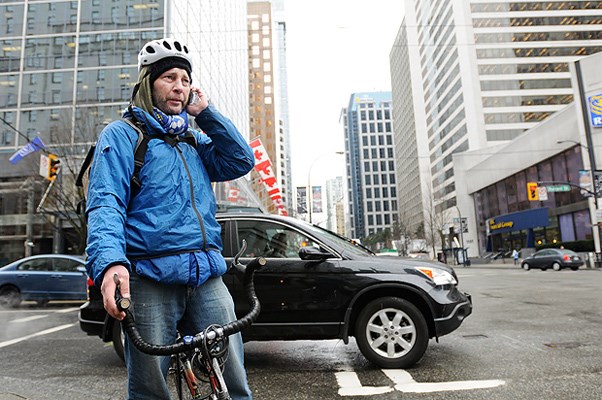When the fax machine became a common business tool in the '80s, the future-is-now advantage of telecopying spelled the demise of the bike messenger.
The future of bike couriers was put in greater jeopardy when email pushed out envelopes, letters, stationary and cards.
Indeed, the number of men and women licensed to dash through Vancouver traffic on two wheels with cargo strapped to their bodies and bikes is falling. Only one in five couriers who worked in 1998 is still working today. From a peak of 412 couriers 15 years ago, last year the city issued only 86 bike messenger licenses. So far in 2013, Vancouver counts 32 licensed bike messengers.
"It keeps declining so you have to find new ways to reinvent yourself," said Harry Bangel, the co-owner of Vancouvers Flash Couriers. Depending on the time of year, Flash employs 10 to 13 bike couriers and a fleet of vehicles although revenue has dipped since they opened shop in 1989. "We're keeping our head above water," said Bangel.
In an age of mass and minimal electronic communication, memos of 140 characters or less, the snap-second chat, the online bill collector, drop-box and tax man, you still cant use Facebook to deliver diamonds to a girls doorstep.
Just ask Teyan Adams. On a frosty January day, he delivered sparkling ice eight blocks from a downtown diamond jeweler to a 20-something in yoga pants.
"I went to a diamond shop for a diamond delivery," he said.
He doesn't know what was inside the package or how much it cost and he wont say which store it came from. The cargo was precious, however, and likely pricey.
Adams, a 43-year-old independent messenger who operates as Action Man Couriers and has a daughter in the midst of university applications, says valuable goods are making up more of his deliveries although he's most regularly called to carry documents and seek out signatures. "With most of the companies, they're going to save a few bucks by emailing it, faxing it. Now what's left is the really, really important stuff, so you have to be really on the ball."
The average bike messenger in Canada earns between $11,000 and $30,000 a year, according to the most recent figures from StatsCan. Adams is paid by delivery and says this about the salary hes earned in the 10 years he's dashed through traffic: "My mantra: high-risk, low-pay and no future. We don't make a fortune. There may be two guys in Vancouver who make 50 grand a year and the rest are all below."
Alex Walls, 28, known as AK, makes $12 an hour, plus commission and is one of the few who draws benefits for himself and his wife and son while working for a Lower Mainland courier service that ships internationally.
Scott Fraser, 38, has seen his income decline by half over nearly two decades. "It's disheartening. I used to make $200 a day 15 years ago and now I struggle to make $100."
He met his girlfriend on regular trips to the bank. She was a teller. He was discrete when he invited her for beer two years ago and slipped her a card that read, "You look really great today."
The job isn't one he wants to leave. "I'm pretty sure I'm going to ride my bike until Im about 80."
Ian Bowles, 26, understands this although he's been a courier for only one year. He met a tight-knit group of cyclists when he moved to Vancouver a year ago and now plays bike polo on tennis courts, rides the velodrome in Burnaby and spends his workdays outside, rain and shine, frost and sleet. "I love bikes and cycling," said Bowles, who earns $150 on a good day and is paid more for high-priority delivery, which he must see through in 30 minutes.
Bike messengers handle goods (from legal briefs and boxes, to baby cribs, coffee, flag poles, eyeballs and dolphin blood) that others are unable to transport with the same speed and consistency through the traffic-choked drudge of one-way streets, pedestrians and clogged parking.
Adams gives an example about a cheque, which he had to pick up, get certified and then delivered by 4 p.m. The call came in at 3:52 and he had three addresses to hit, which is basically impossible, he said, but that's the courier's life. "We do the impossible all the time. You get paid more to go fast, so you go fast."
The concentration of bike messenger companies is an indication of a robust urban economy, according to a 2011 study from the University of Toronto Rotman School of Management. The number of couriers doesn't cause the marketplace to hum, but a high number indicates it is humming.
Adams says his is an essential service in a city like Vancouver. "I've had people say, 'You saved my job. You know, you did this quicker than anyone else can do it
"We know what were doing. We're an essential part of business."
Twitter.com/MHStewart



